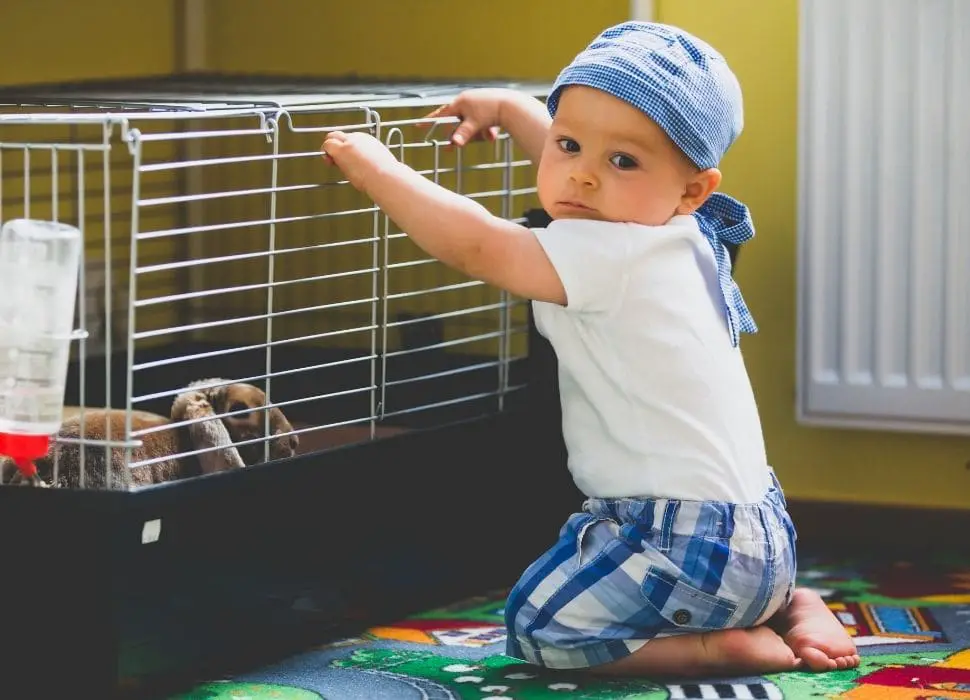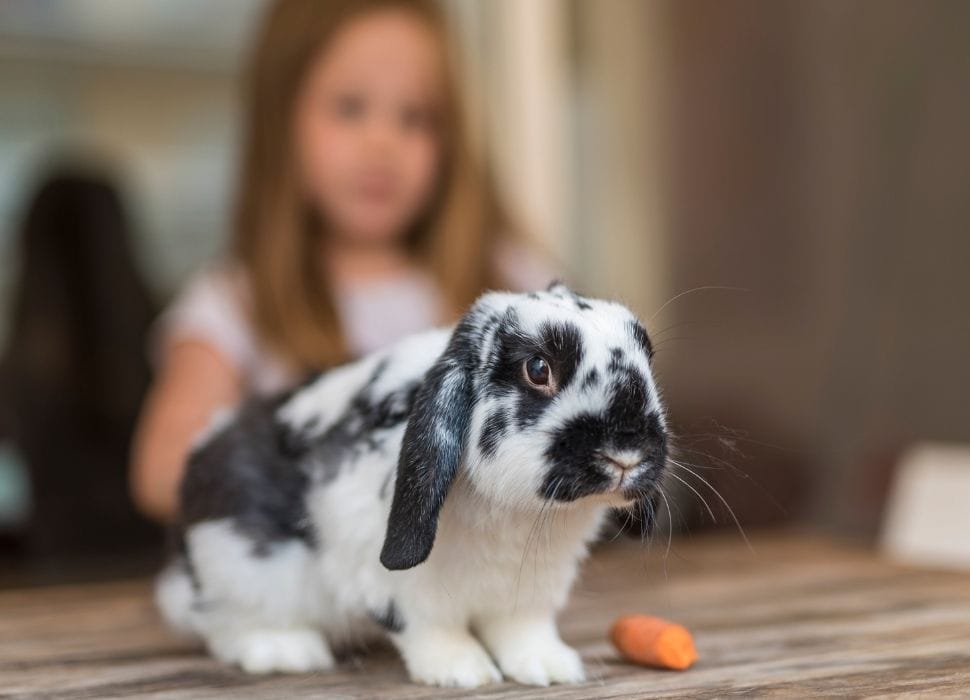Rabbits are the UK and America’s third favorite pet, behind cats and dogs however a bunny’s cuteness is also its biggest curse. Lots of children visiting pet stores are naturally drawn to baby rabbits, after all they are often used as characters in many popular children’s TV shows, but what is the truth? Is a rabbit really a good pet for a child?
A rabbit is not a good pet for a child because rabbits are delicate animals that require an 8 year plus commitment, specialist care, and frequent cleaning to ensure they remain in good health. Rabbits as prey animals may also feel threatened if mishandled by children.
If you’ve really had your heart set on getting a rabbit for your own child, we’re really sorry to disappoint you with this somewhat blunt answer to this question, however, if you’d care to stick around for a little while after we’ll explain in some more detail why we advise against a rabbit as a pet for a young child.
Why is a rabbit the wrong pet for a child?
As small and seemingly low maintenance pets, parents are sometimes keen to get a baby rabbit for their children without any real awareness of the magnitude of the task they have just unwittingly taken on.

Test this out for yourself, ask a non-rabbit owner how long they believe a rabbit lives and you’ll more than likely get an answer close to two or three years, people are often shocked when you tell them that a well looked after rabbit might live for 12 years or more!
Due to their low buying cost, and their overwhelming cuteness (we all know rabbits are the cutest babies!) rabbits are often bought on a whim by parents who believe they will make an easy little pet for their child.
These parents misleadingly believe that their child will be able to handle the commitment which is rarely the case. They’ll have a cute pet to cuddle, carry around, and pet as much as they like. Of course, the rabbit will be quite ok in between those times, usually in an unsuitably tiny hutch with a simple diet of lettuce and carrots and just imagine all those cute Facebook and Instagram posts!

This impression of rabbits is not helped by the media or children’s Television. You’ll often see rabbits happily sat on the lap of a contented child which leads people to believe that they are an easy pet to look after.
This reputation of rabbits as simple and easy pets is of course not true and while a baby rabbit might not mind being carried about (or at least won’t be able to object to it) an adult rabbit is often very different.
Put simply, cute baby bunnies grow up!
If you choose to go out and buy your child a rabbit without any prior knowledge you are setting yourself up for failure both on the part of your child who will end up frustrated when it starts to object to being grabbed and the rabbit who relies on you for his care and will probably end up suffering a very grim fate, namely neglect.
Rabbits require a lot of care and contrary to what profit-driven pet or general stores would have you believe from the small size of the hutches they often sell, they also need lots of space!
If you’re considering buying your child a pet, the message here is quite simple, animals are not toys! If you are a parent and your child is pestering you for a pet eventually it’s you who is going to be left with the responsibility of looking after it after the child loses interest!
Are you really OK with that?
In the case of rabbits this means looking after it for up to 12 years! Now that is a big commitment!
Rabbits are very complex pets
The untold truth about rabbits is that they are complex and sensitive pets. They mature between 3 and 6 months of age during which time they will go through a phase similar to dealing with a teenager going through puberty!
The rabbit will probably start to display ‘attitude’ possibly even aggression, they may chew furniture and males may spray everywhere to mark their territory.
Lots of these behaviors can of course be curbed by spaying and neutering procedures and sufficient exercise/playtime. Even litterbox training is quite an easy process with a bunny.
However, those who have bought rabbits on a whim often have no desire to attain the knowledge or address these problems and behaviors. Even those who do the research and understand that spaying or neutering can sort out these issues are not always willing to fork out a couple of hundred dollars to spay or neuter a rabbit that their child no longer wants to play with anyway.
Consequently, no longer the tiny cute bunny it once was, the rabbit is all too often given up to a shelter, left in a garden hutch to a fate worse than death or set free (a literal death sentence for domesticated rabbits).
Sadly this is a chain of events that takes place usually less than a year after the rabbit was initially bought.
So how can we prevent this situation? well If you’re considering any animal be it for a child or for yourself take some time to learn as much about it as possible beforehand. What will it mean to bring this animal into your home and how will it affect your life?
Are you willing to make it part of your family?
Do you have the time, money, and means to look after it and provide not only its essential needs but give it companionship and love to help it lead a healthy and enjoyable existence?
Think about the long term consequences of owning the pet.
Is your child really old enough and responsible enough to take care of it?
Will he/she get bored with it, (remember realistically you are going to end up caring for it, in the case of rabbits this is a very long commitment!)
Will your child even be around for the duration of the rabbit’s life and if not, are you willing to look after the rabbit when/if your child grows up and leaves home to go to college or university?
Educate yourself before getting a rabbit
If you still think that a rabbit will be a good fit for your home despite all these things, don’t just buy a bunny on some Easter whim. A rabbit’s well-known breeding reputation and popularity mean that there is not and will there ever be a shortage of baby rabbits.
First educate yourself and your child on what a rabbit is really like, particularly as an adult (you’ll notice that you rarely see grown-up bunnies for sale in pet stores – ask yourself why this might be (hint* adult bunnies are a handful!).
Introduce your child to an adult rabbit (perhaps visit a shelter) are they still interested? Let them know that this is what a baby bunny becomes in a very short time! You’ll often find that children are scared of adult rabbits and this might be enough to curb their interest.
A shelter will also be more than willing to discuss the problem of rabbit abandonement with you.
Still interested? adopt, don’t Buy!
Assess your child’s interest over time before making a final decision. Children love rabbits, especially baby bunnies but consider that there are plenty of rabbits of all ages that need a loving home.
Babies while cute, need neutering, spaying, and extra care. Their personalities are also not yet developed and when they start to mature, these can change completely.
Every rabbit is different and you don’t really know what you are going to get until a good while after spaying and neutering have been carried out!
If you still think a bunny is right for your home, nothing is more rewarding than adoption. Taking on a rabbit that is no longer a juvenile allows you to know exactly what you are getting and children of a caring nature will usually respond to a lonely bunny in need of a loving home.
Here are some essential points to remember before taking on a rabbit:
Rabbits need space in order to exhibit natural behaviors like telegraphing (standing up on two feet to look around for predators) and binkying (happy sporadic leaps!) rabbits will be extremely depressed in a tiny hutch (a hutch is not enough!).
- Educate yourself and spend time with adult rabbits (don’t believe everything you see on TV).
- Rabbits though mostly silent are complex and have expressive personalities that they only display if they are happy!
- Rabbits need company, they are very social animals, if you can’t provide them with a friend of their own species you will need to give them plenty of attention, they want to feel part of the family!
- Rabbits generally don’t like being picked up, babies tolerate it because they have no choice, adults, however, may kick and scratch (learn how to pick up a rabbit safely here).
- Some rabbits don’t like to be petted (you’ll often see these ones cleaning themselves after being touched by their filthy human!).
- Rabbits are expensive, they need quality fresh foods, and an unlimited supply of hay, owning a rabbit means constant trips to the supermarket.
- Rabbits poop constantly! A rabbit can be litter trained but accidents will happen. If you’re squeamish about poop, a rabbit is not the pet for you.
- Rabbits are prey animals and easily scared, some will hide for hours under the bed if you don’t respect their space, some might even bite to defend themselves.
- Rabbits need enrichment. Provide them plenty of toys to play with or they will chew the furniture or dig on you or your carpet.
- Rabbits need you to provide a safe environment. This means hiding cables, and things that may fall on them as they explore your home environment, also hide anything you care about – otherwise don’t be surprised to find holes in your shirts if you leave them lying around on a floor.
- If you have other pets consider their feelings when deciding whether or not to bring a rabbit into your home, will it be accepted by them?
If you have any other questions about rabbits you may like to read about the realities of rabbit ownership. Remember, next time Easter rolls around, choose a chocolate bunny over a real one.
Further Reading
Do Rabbits Make Good Pets for Children? campnibble.com
Are Rabbits Good Pets for Kids? onegreenplanet.org
6 Best Small Pets to Consider for Children parents.com
